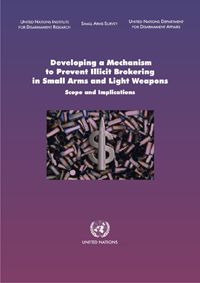During the past decade, the problems posed by unregulated arms brokering activities have become an issue of growing concern for governments, international organizations and civil society in the context of international efforts against the illicit trade in small arms and light weapons. An important body of research has brought the role of arms brokers in facilitating arms transfers to unlawful or illegitimate recipients to the fore of the political agenda. Despite their central role in the arms business, the activities of arms brokers are often unregulated. Arms brokers who facilitate unlawful arms transfers are aiding and abetting violators of arms embargoes, armed groups, criminal gangs and terrorists, thus fuelling insecurity and conflict in many regions of the world.
A number of regional organizations and groups of states have developed instruments and standards for the regulation of brokering activities that the respective member states are encouraged or required to adopt. Such instruments could form the basis of a global effort to curb illicit arms brokering. Partly as an effect of these regional agreements, about 40 countries throughout the world have developed specific controls on brokering activities. In the majority of national legislations, however, brokering activities remain unregulated. In addition, loopholes and inconsistencies in existing systems of control continue to be exploited by unscrupulous brokers.
Following the Secretary-General's consultations with all Member States and interested regional and subregional organizations, and recognizing the need for concerted global action, in 2005 the United Nations General Assembly adopted resolution 60/81 establishing a group of governmental experts to consider further steps to enhance international cooperation in preventing, combating and eradicating illicit brokering in small arms and light weapons.
This study, conducted under the auspices of the United Nations Coordinating Action on Small Arms (CASA), examines existing instruments at the national and international levels. It aims to identify common elements and options for regulation, to enhance understanding of the issue and to clarify its most complex aspects.
Citation: United Nations Institute for Disarmament Research, Small Arms Survey, and United Nations Department for Disarmament Affairs (2006). "Developing a Mechanism to Prevent Illicit Brokering in Small Arms and Light Weapons: Scope and Implications", UNIDIR, Geneva.
